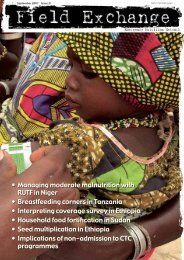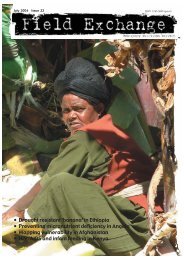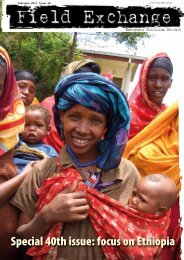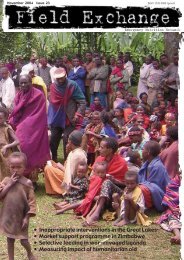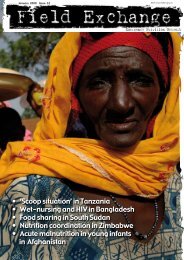Download a PDF of this issue - Field Exchange - Emergency ...
Download a PDF of this issue - Field Exchange - Emergency ...
Download a PDF of this issue - Field Exchange - Emergency ...
Create successful ePaper yourself
Turn your PDF publications into a flip-book with our unique Google optimized e-Paper software.
Research<br />
benefits to programmes and communities.<br />
Targets for research output should be set (e.g.<br />
one or two research papers each year submitted<br />
to a peer-reviewed journal), with financial<br />
and technical support continued when targets<br />
have been met and termination <strong>of</strong> support if<br />
targets have been missed. Young national<br />
researchers should have the opportunity to<br />
present scientific abstracts and participate at<br />
regional and international conferences, and<br />
more attention should be paid to teaching the<br />
principles <strong>of</strong> how to write scientific papers<br />
and to mentoring.<br />
Rachel Bezner Kerr, Malawi, 2011<br />
Attention must also be paid to the problem<br />
<strong>of</strong> poor access to up-to-date scientific literature,<br />
and despite laudable initiatives (such as the<br />
Health InterNetwork Access to Research<br />
Initiative), <strong>this</strong> remains a barrier in low-income<br />
countries. Free and open access for all articles <strong>of</strong><br />
interest to low-income countries is urgently<br />
needed. For example, Médecins Sans Frontières<br />
(MSF) has negotiated with publishers to allow<br />
free access to all articles written by its staff.<br />
The distinct role for NGOs in operational<br />
research should be recognised for two main<br />
reasons. First, NGOs such as MSF <strong>of</strong>ten work<br />
in conflict settings, with marginalised and<br />
vulnerable populations, or with neglected<br />
diseases. Academics rarely have access to such<br />
settings, and national programmes might<br />
decide they do not have sufficient resources to<br />
study them. Research in these areas is, nevertheless,<br />
needed to better understand how to<br />
manage questions such as mental health <strong>issue</strong>s<br />
in war zones, treatment and diagnosis <strong>of</strong><br />
neglected diseases, or <strong>of</strong>fering <strong>of</strong> HIV/AIDS<br />
care in slum settings. Secondly, NGOs are, by<br />
mandate, implementers and can thus be<br />
involved in the translation <strong>of</strong> research findings<br />
into policy and practice. If they have skills in<br />
research and advocacy as well as sufficient<br />
financial and human resources, then they<br />
probably have the potential to actively engage<br />
in operational research and help change practice.<br />
However, NGOs are sometimes not the<br />
appropriate entities for designing or implementing<br />
research. They might lack the<br />
institutional support, culture, and skills for<br />
interacting with national programmes and<br />
decision makers. NGO focus might be on solving<br />
localised, short-term problems, they might<br />
have had little exposure to systems thinking<br />
.and they might lack the training and capacity<br />
to do rigorous research. They might also have<br />
a rapid turnover <strong>of</strong> staff, which hinders the<br />
sustainability <strong>of</strong> research and the ability to<br />
build up trust and understanding with country<br />
partners. These points might explain why<br />
NGOs rarely undertake research, are rarely<br />
asked by country programmes to do so, and<br />
why the research they do undertake is sometimes<br />
badly done, with little or no programme<br />
impact.<br />
The authors conclude that they have made<br />
the case for the importance <strong>of</strong> operational<br />
research as a necessary component <strong>of</strong> health<br />
programming in low-income countries. What<br />
is needed now is further development <strong>of</strong> operational-research<br />
capacity, allocation <strong>of</strong> specific<br />
resources, and the need for different participants<br />
such as international and national<br />
academic institutions, national programme<br />
managers, and NGOs to work together in<br />
promoting operational research.<br />
Margaret Shonga, participating farmer, her<br />
husband Donald Gondwe and their baby,<br />
standing in a field <strong>of</strong> sorghum<br />
Effects <strong>of</strong> agricultural and nutrition<br />
education projects on child health in<br />
Malawi Summary <strong>of</strong> published research 1<br />
A recent study set out to investigate<br />
whether children in households involved<br />
in a participatory agriculture and nutrition<br />
intervention had improved growth<br />
compared to children in matched comparable<br />
households. The study also explored<br />
whether the level <strong>of</strong> involvement and<br />
length <strong>of</strong> time in the project had an effect<br />
on child growth.<br />
The Soils, Food and Healthy<br />
Communities project (SFHC) was initiated<br />
by Ekwendeni Hospital and aimed to<br />
improve child nutritional status amongst<br />
smallholder farmers in a rural area in<br />
northern Malawi. In villages surrounding<br />
Ekwendeni, a town in Mzimba district,<br />
Esnai Ngwira, participating farmer, and<br />
her children, standing beside her maize<br />
field grown after legume residue buried<br />
into the ground<br />
Rachel Bezner Kerr, Malawi, 2011<br />
over half <strong>of</strong> the smallholder families experience<br />
food insecurity every year. Malaria<br />
is endemic and child malnutrition rates are<br />
similar to the national average at 48%.<br />
Agricultural interventions involved intercropping<br />
legumes and visits from farmer<br />
researchers, while nutrition education<br />
involved home visits and group meetings.<br />
The study employed a prospective<br />
quasi-experimental approach comparing<br />
baseline and follow up data in intervention<br />
villages with matched subjects in comparison<br />
villages. Mixed model analyses were<br />
conducted on standardised child growth<br />
scores (weight- and height-for-age Z-<br />
scores), controlling for child age and<br />
testing for effects <strong>of</strong> length <strong>of</strong> time and<br />
intensity <strong>of</strong> village involvement in the<br />
intervention.<br />
Participants in intervention villages<br />
were self-selected and control participants<br />
were matched by age and household food<br />
security status <strong>of</strong> the child. Over a six year<br />
period, nine surveys were conducted<br />
taking 3,838 height and weight measures <strong>of</strong><br />
children under the age <strong>of</strong> 3 years.<br />
The study found that there was an<br />
improvement over initial conditions <strong>of</strong> up<br />
to 0.6 in weight-for-age (WAZ) Z-score<br />
(WAZ: from -0.4 (sd 0.5) to 0.3 (sd 0.4)) for<br />
children in the longest involved villages,<br />
and an improvement over initial conditions<br />
<strong>of</strong> 0.8 in WAZ for children in the most<br />
intensely involved villages (from -0.6 (sd<br />
0.4) to 0.2 (sd 0.4)).<br />
The authors conclude that longterm<br />
efforts to improve child nutrition through<br />
participatory agricultural interventions<br />
had a significant effect on child growth.<br />
1<br />
Bezner Kerr R, Berti P and Shumba L (2011). Effects<br />
<strong>of</strong> a participatory agriculture and nutrition education<br />
project on child growth in northern Malawi. Public<br />
Health Nutrition 14 (8), 1466-1472<br />
20



